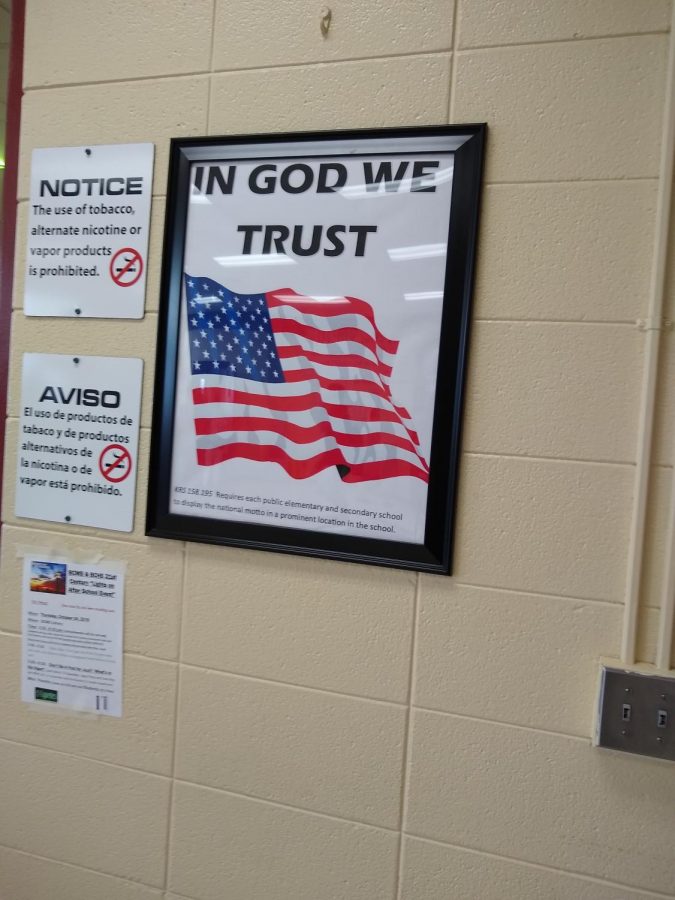The “In God We Trust” Poster
Text along the bottom of the poster reads, “KRS 15B.195 Requires each public elementary and secondary school to display the national motto in a prominent location in the school.”
October 29, 2019
22.8% to 24% of Americans are either agnostic, atheist, or not religiously affiliated, and that number is only rising. This school year, the Kentucky General Assembly has made it mandatory that somewhere in each public school, there is a poster saying “In God We Trust”. An overwhelming majority of schools in Lexington have complied by enlarging images of the back of a one-dollar bill and putting them on their walls. Bourbon County High School took this differently and has a poster in the lobby with the words upon it. The issue with this poster is that it violates the fundamental idea of separation of church and state, which is a result of the 1st amendment.
The freedom of religion is immensely important to our country’s history. The colonists of Plymouth in the 1620s escaped religious persecution in England, and that persecution resulted in the freedom of religion, protected by the first amendment. However, “it is actually illegal to not have the poster (or at least the motto) visible in the school.” says Brayden Friedman, a social studies teacher, “The Kentucky General Assembly passed the requirement into law. For the display to be illegal, the General Assembly would have to pass a new law, or a judge would have to rule that it violates either the Kentucky State Constitution or the U.S. Constitution.” This complicates things, the school isn’t able to take down the poster without breaking a law; prompting the question, does this actually impede our rights?
According to Friedman, “The phrase ‘Under God’ has a controversial history. Typically, judges allow the phrase because the word ‘god’ is used in many different religions. It could be argued, however, that it does impede the rights of those who do not believe in a god or who worship many gods by using their tax dollars to fund the display of a religious statement they do not abide by.” The phrase “Under God” in the United States’ Pledge of Allegiance, was only added in 1954. Its history is rooted in the Red Scare and Cold War, in which the USA wanted to distinguish itself from the Union of Soviet Socialist Republics (USSR), a country without religious freedom, by reconnecting with Christianity. This included the statement, “Under God” added to the Pledge of Allegiance and “In God, we trust” becoming our national motto.
More recently, our national motto has become slightly outdated. With the atheist/agnostic population increasing, the phrase, “In God we trust” is beginning to impede on the rights of citizens. When asked what students should do if they are uncomfortable with the situation, Friedman said, “If students disagree with the law, they should exercise their Constitutional rights. Remember, however, that anything that impedes learning is usually not protected. Students can write letters, start petitions, or vote if they are able (or encourage those that are of age).” If you feel uncomfortable, speak out or protest.
The ideology of catering to one specific group, in this case, those who believe in God, opens the doorways to what some call “the tyranny of the majority.” This means that when the majority (Christians) cater only to their own interests, it does so at the expense of the beliefs of the minorities. If this poster resides in our school, then it can’t be the only one. Those that worship or believe in anything else should get a poster too. Even the religious groups that get a bad reputation. This can be difficult, and our walls would be absolutely covered. This just proves how “fair” this obligation is. This is why there has always been a clear separation between church and state because it’s easier to not say or mention God at all, then it is to involve religion in schools.


